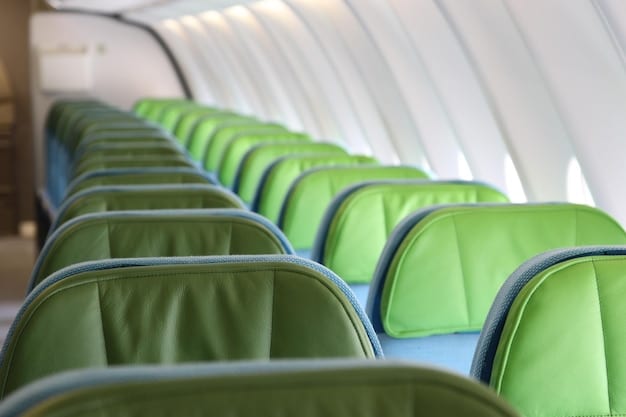Avoid Hidden Airline Fees 2025: Save 15% on Flights

Navigating the complex world of air travel in 2025 means understanding and circumventing the myriad of hidden fees airlines increasingly impose, from seat selection to baggage, enabling travelers to potentially save up to 15% on their airfares by being informed and strategic.
In the evolving landscape of air travel, what once seemed like a straightforward purchase has become a labyrinth of additional charges. Understanding the 7 Hidden Airline Fees and How to Avoid Them in 2025: Save Up to 15% on Your Next Flight is no longer just a smart travel tip—it’s an essential strategy for any savvy traveler hoping to keep their budget intact. By being informed and proactive, you can significantly reduce the overall cost of your trip.
Understanding the Evolution of Airline Fees
Airline fees have undergone a significant transformation over the past decade, moving from a niche revenue stream to a fundamental component of airline profitability. What started with charges for checked bags has expanded into a comprehensive list of services that were once included in the base fare. These fees allow airlines to advertise lower base prices, attracting customers who then find themselves paying more for essential services.
The strategy behind these fees is multifaceted. For airlines, it’s about unbundling services to offer greater flexibility and choice, theoretically empowering passengers to pay only for what they need. However, for consumers, it often means navigating a confusing array of options and encountering unexpected costs that can quickly diminish the initial savings of a cheap flight. This shift requires travelers to be more vigilant than ever.
The “À La Carte” Model: A Double-Edged Sword
The “à la carte” pricing model has become standard across the industry. While some travelers appreciate the ability to customize their journey, it inherently places the burden of knowing what to expect on the passenger. Without this knowledge, what appears to be a good deal can rapidly escalate into an expensive endeavor. Understanding the common categories of fees is the first step in avoiding them.
- Unbundled Services: Airlines separate services like baggage, seat selection, and in-flight meals from the base fare.
- Increased Profit Margins: Ancillary fees contribute significantly to airline revenues, often representing a substantial portion of their earnings.
- Competitive Pricing: Lower base fares create an illusion of greater affordability, driving competition based on headline prices rather than total cost.
As we move into 2025, this trend shows no signs of slowing down. Airlines are continually innovating to find new ways to offer services at an additional cost, making it crucial for passengers to stay informed and adapt their booking strategies to protect their wallets.
Baggage Fees: The Perennial Challenger
Baggage fees remain one of the most significant and frequently encountered additional costs for air travelers. What began primarily with checked luggage has evolved to include charges for carry-on bags on certain budget airlines, particularly if they exceed specific dimensions or weight. For many, a single checked bag can add a substantial percentage to the cost of a domestic flight, especially if you’re flying with a family.
The rules around baggage are intricate and vary wildly between airlines, and even between different fare classes on the same airline. Some airlines include a small carry-on, while others consider anything larger than a personal item (like a small backpack or purse) to be subject to a fee. Understanding these nuances before you pack is crucial to avoiding surprise charges at the airport, where fees are often higher.
Strategies for Outsmarting Baggage Charges
Avoiding baggage fees requires a proactive approach and some clever planning. It’s not just about packing light; it’s about being strategic about how you pack and with whom you fly. Every dollar saved on baggage can go towards experiences at your destination.
- Travel Light: Whenever possible, travel with only a personal item that fits under the seat in front of you. This is the simplest and most guaranteed way to skirt fees.
- Airline Credit Cards: Many co-branded airline credit cards offer free checked bags for the cardholder and sometimes even for companions traveling on the same reservation.
- Join Loyalty Programs: Elite status with an airline often grants complimentary baggage allowances, among other perks.
- Compare “All-In” Prices: When booking, always compare the total cost, including anticipated baggage fees, rather than just the base fare. Sometimes a slightly more expensive ticket with baggage included is cheaper overall.
Always double-check the airline’s specific baggage policy for your route and fare type. Ignorance can be costly, especially at the check-in counter. Being prepared can save you a significant amount, helping you adhere to your travel budget more effectively.
Seat Selection Fees: Paying for Comfort and Proximity
Gone are the days when picking your seat was a simple, complimentary part of the booking process. Today, most airlines charge for advanced seat selection, especially for preferred seats like those with extra legroom, near the front of the cabin, or aisle/window seats. Even standard middle seats can incur a fee if you wish to guarantee your spot before check-in. This fee structure is a significant revenue generator, contributing to the “unbundling” trend across the industry.
For families traveling together, seat selection fees can be particularly burdensome as they often need to guarantee adjacent seats for children, especially young ones. The cost can quickly add up, turning a family trip into a more expensive venture than initially planned. It’s a calculated gamble for airlines: pay for certainty, or risk being separated or stuck in an undesirable seat.

How to Navigate Seat Selection Without Breaking the Bank
While paying for a specific seat offers peace of mind, there are strategies to avoid or minimize these fees. Flexibility and timing are often your best allies when it comes to seat assignments.
- Wait Until Check-in: Many airlines release unassigned seats for free when online check-in opens (typically 24 hours before departure). If you’re flexible about your seat preference, this can be a viable option.
- Utilize Elite Status or Premium Fares: Travelers with airline elite status or those who purchase higher fare classes (e.g., economy plus or premium economy) often have complimentary seat selection included.
- “Family-Friendly” Policies: Look for airlines that have explicit policies for seating families together without charge, especially those with young children. Always verify this directly with the airline.
- Use Third-Party Tools: Websites or apps like SeatGuru can help you identify the best seats on a particular aircraft model, allowing you to make an informed decision if you do decide to pay.
Ultimately, the decision to pay for seat selection depends on your priorities. For short flights or if you’re traveling solo and don’t have strong preferences, waiting until check-in is a great way to save. For longer journeys or if traveling with specific needs, weighing the cost against comfort and convenience is essential.
Change and Cancellation Fees: The Flexibility Premium
The ability to change or cancel a flight without penalty was once a standard offering, but those days are largely in the past. Today, airlines levy substantial fees for itinerary changes or cancellations, often totaling hundreds of dollars for domestic flights and even more for international journeys. These fees penalize travelers whose plans are uncertain, forcing them to either commit firmly or pay a premium for flexibility.
While some airlines temporarily relaxed these policies during the pandemic, many have reinstated or modified them, making it crucial to understand the terms and conditions before booking. Low-cost carriers are particularly rigid, often offering non-refundable and non-changeable tickets, or charging fees that sometimes exceed the cost of a new ticket. This financial disincentive makes careful planning paramount.
Minimizing the Impact of Change and Cancellation Fees
Avoiding these fees usually comes down to foresight and leverage. While you can’t predict every life event, you can choose providers and policies that offer more protection.
- Purchase Flexible Fares: Some airlines offer slightly more expensive “flexible” or “economy plus” tickets that allow changes or cancellations without a fee, or for a reduced fee. This can be a worthwhile investment if your plans are prone to alteration.
- Travel Insurance: Consider purchasing travel insurance, especially for expensive trips or if there are specific concerns (e.g., health issues, unpredictable work schedules). Policies can cover cancellation for a variety of reasons, though specific terms vary.
- Credit Card Benefits: Many premium travel credit cards include trip cancellation and interruption insurance as a perk. Check your card’s benefits guide to see if you have this coverage.
- 24-Hour Rule: According to DOT regulations, airlines must allow you to change or cancel a flight within 24 hours of booking without penalty, provided the booking was made at least seven days before departure. This window allows for immediate corrections if you find a better fare or realize an error.
While life is unpredictable, being aware of these potential costs and incorporating protective measures can save you a significant amount if your plans change. Always read the fine print regarding an airline’s change and cancellation policy before finalizing your purchase.
In-Flight Services: From Wi-Fi to Water, a Drip-Feed of Charges
The experience onboard has also become a source of hidden fees. Basic amenities that were once complimentary, such as meals on longer domestic flights, blankets, pillows, and even sometimes water, are now often subject to a charge. Beyond these essentials, premium services like in-flight Wi-Fi, entertainment upgrades, and alcoholic beverages all contribute to the overall potential expenditure during your journey.
These charges are often less transparent during the booking process and only become apparent once you are airborne. For many travelers, knowing that they can purchase these items on board provides a sense of flexibility, but the cumulative effect of these small transactions can add up, pushing the total travel cost beyond initial expectations. It’s especially noticeable on longer flights where these amenities become more desirable.
Smart Choices for In-Flight Spending
While some in-flight services are unavoidable if you need them, many can be circumvented with a bit of planning, ensuring your flight experience remains comfortable without draining your wallet.
- Bring Your Own Snacks and Drinks: Pack non-liquid snacks (e.g., granola bars, fruit) and an empty reusable water bottle to fill up after clearing security.
- Download Entertainment: Before your flight, download movies, TV shows, podcasts, or e-books to your personal devices. This eliminates the need for expensive in-flight entertainment or Wi-Fi.
- Charge Devices: Ensure all your electronic devices are fully charged before boarding to avoid needing in-flight power, which can sometimes be a paid service.
- Consider Airline Membership/Bundles: Some airlines offer bundles that include Wi-Fi access or premium entertainment at a reduced rate if purchased in advance, though this is often only cost-effective for frequent travelers.
By preparing for your flight thoughtfully, you can minimize or entirely avoid many of the in-flight fees, ensuring a pleasant journey that stays within your budget. Remember, comfort doesn’t always have to come at a premium if you plan ahead.

Payment Processing and Booking Fees: The Digital Tax
In an era dominated by digital transactions, it might seem counterintuitive to encounter fees simply for paying for your flight or booking online. However, some airlines, particularly low-cost carriers, levy payment processing fees, especially for certain credit card types. Furthermore, booking through a call center or at the airport counter often incurs an “agent assistance fee,” pushing travelers toward self-service online booking while still potentially adding charges to the digital pathway.
These fees are frequently hidden in the fine print or only appear during the final stages of the booking process, just before payment. They can be particularly frustrating because they don’t relate to a physical service but rather to the administrative overhead of processing the transaction. For budget-conscious travelers, every small fee adds up, making vigilance essential at every step of the reservation.
Smart Strategies for Minimizing Payment and Booking Fees
Navigating these seemingly bureaucratic charges requires a keen eye and sometimes a preference for specific payment methods or booking channels. Awareness is key to sidestepping these often-unseen costs.
- Check Payment Methods: Some airlines waive fees for specific payment methods, such as debit cards or certain local payment systems. Always check the airline’s policy before selecting your payment option.
- Book Directly Online: Whenever possible, book directly on the airline’s official website. This avoids third-party booking fees and typically offers the lowest administrative charges.
- Avoid Phone/Airport Bookings: Reserving tickets over the phone or at the airport usually incurs an additional agent booking fee, which can be substantial.
- Loyalty Programs and Bundles: Occasionally, purchasing full-service bundles or having elite status with an airline might waive certain administrative fees, though this is less common for basic booking charges.
By being mindful of how and where you book your flight, and understanding the nuances of payment processing, you can often avoid these silent but significant additions to your travel expenses, keeping your focus on the journey itself.
Loyalty Program Fees: Cashing in Your Hard-Earned Miles
One might assume that using loyalty points or miles, earned through diligent travel or credit card spending, would be a straightforward process to get a “free” flight. However, airline loyalty programs often come with their own set of fees, impacting the perceived value of your rewards. These can include surcharges for booking award tickets, fees for changing or canceling award flights, and sometimes even fees for transferring miles to another account or extending their expiration date.
While the base cost of an award ticket might be covered by miles, the taxes, fees, and surcharges can still add up to a significant amount, especially for international travel or on certain airlines notorious for high surcharges. This can make a “free” flight anything but, requiring travelers to weigh the cost in miles against the cash equivalent after factoring in all additional charges.
Maximizing Value, Minimizing Fees on Award Travel
To truly maximize the value of your accumulated miles and points, it’s essential to understand and strategically navigate these loyalty program fees. A little research can go a long way in ensuring your rewards provide genuine savings.
- Research Airline Surcharges: Some airlines levy much higher fuel surcharges and carrier-imposed fees on award tickets than others. Research which airlines offer lower fees for award travel on your desired routes.
- Book Well in Advance: Changing or canceling an award ticket usually incurs a fee, which can often be higher than cash tickets. Solidify your travel plans before redeeming miles to avoid these charges.
- Consider Off-Peak Travel: Award availability is often better, and sometimes fees might be slightly lower during off-peak seasons, giving you more options to choose from.
- Utilize Credit Card Transfer Bonuses: If transferring points from a credit card to an airline, look for transfer bonuses, which can effectively reduce the number of miles needed, indirectly mitigating fee impact.
By becoming a strategist in the world of loyalty programs, you can significantly enhance the value of your miles, turning them into truly cost-effective travel experiences rather than merely discounted ones. The key is understanding that “free” often comes with its own price tag.
| Key Fee | Avoidance Tip |
|---|---|
| 💼 Baggage Fees | Travel light or use airline credit card perks. |
| 💺 Seat Selection | Wait until check-in for free assignments. |
| 🔄 Change/Cancellation | Consider travel insurance or flexible fares. |
| 💡 In-Flight Purchases | Pack your own snacks, water, and entertainment. |
Frequently Asked Questions About Airline Fees
The most common hidden fees include baggage charges (checked and sometimes carry-on), seat selection fees, change and cancellation penalties, and charges for in-flight services like Wi-Fi or meals. Payment processing fees and award ticket taxes/surcharges also frequently surprise travelers.
To avoid baggage fees, travel light with only a personal item, utilize baggage allowances from airline co-branded credit cards or elite status, or always compare the “all-in” price when booking, including potential baggage costs. Planning ahead is crucial.
Yes, it’s often possible to get a seat for free by waiting until online check-in (usually 24 hours before departure) when unassigned seats are released. However, you might not get your preferred choice. Elite status or premium fares often include free seat selection.
The “24-hour rule” is a DOT regulation allowing passengers to change or cancel a flight within 24 hours of booking without penalty, provided the booking was made at least seven days before the flight’s departure date. This offers a small window for corrections.
Loyalty program fees can significantly impact “free” award flights through taxes, surcharges, and fees for changes/cancellations of award tickets. Always research the total cash cost associated with an award redemption, as it can sometimes outweigh the value of using miles.
Conclusion
As the air travel industry continues to evolve, so too does the intricate web of hidden fees that can significantly impact your travel budget. By understanding and strategically navigating the 7 Hidden Airline Fees and How to Avoid Them in 2025: Save Up to 15% on Your Next Flight, you equip yourself with the knowledge to make informed decisions, transforming potential monetary pitfalls into substantial savings. Proactive planning, from packing light to meticulous booking, is your best defense against these additional costs. Ultimately, a well-informed traveler is a well-prepared and economically savvy traveler, ensuring your focus remains on the joy of your destination rather than unexpected expenses.





